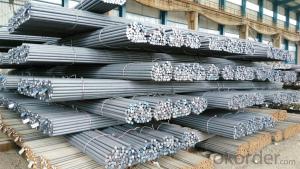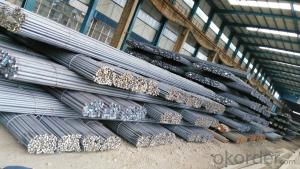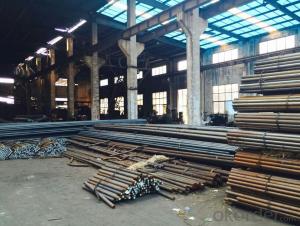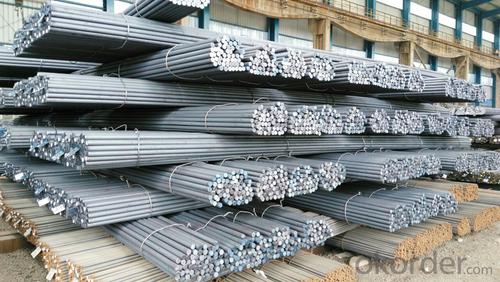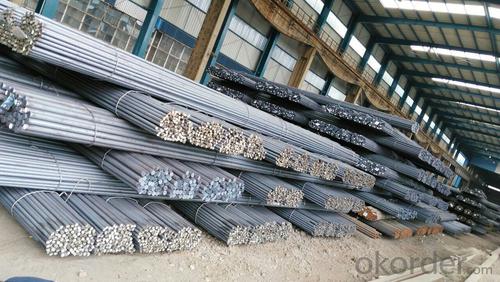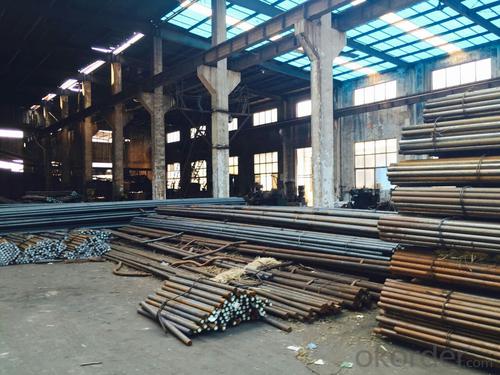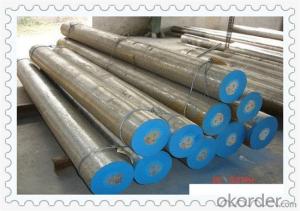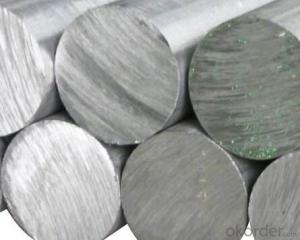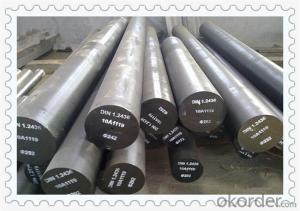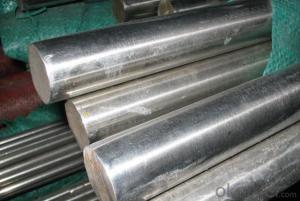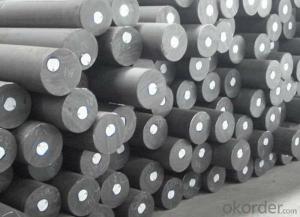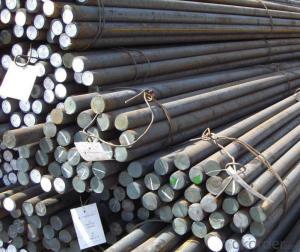Round Bar C60 Carbon Steel 16-300mm
- Loading Port:
- Tianjin
- Payment Terms:
- TT OR LC
- Min Order Qty:
- 25 m.t.
- Supply Capability:
- 50000 m.t./month
OKorder Service Pledge
OKorder Financial Service
You Might Also Like
Specification
Round Bar C60 Carbon Steel 16-300mm
Product details:
Name:Round bar aisi 1060 carbon steel
Place of Origin:Liaoning,China Brand Name:Dongbei Tegang
Shape:round bar Material: Alloy Structural Steel
Steel Grade: AISI 1060/JIS S58C/DIN C60/GB 60
Size:Diameter:10mm~1000mm
Application:used in making high strengthened and wear resistant parts that works under high pressure, like axle, spring ring, axletree, cam, and steel sling etc.
Chemical Composition:
C | Si | Mn | Cr | Ni | Cu | P | S |
0.57-0.65 | 0.17-0.37 | 0.50-0.80 | ≤0.25 | ≤0.30 | ≤0.35 | ≤0.035 | ≤0.035 |
Characteristics:
- High hardness, strength and toughness.
- Poor plasticity during cold deformation.
- Medium machinability.
- Poor weldability.
- Poor hardenability.
- Cracks is often caused during water quenching process.
- Large parts should be in normalizing treatment.
Application:
S60C structural carbon steel bar /1060 /60/C60 can be used to be manufactured roller, shaft, tyre, spring ring, damping spring, clutch and steel wire rope, etc.
Product Show:
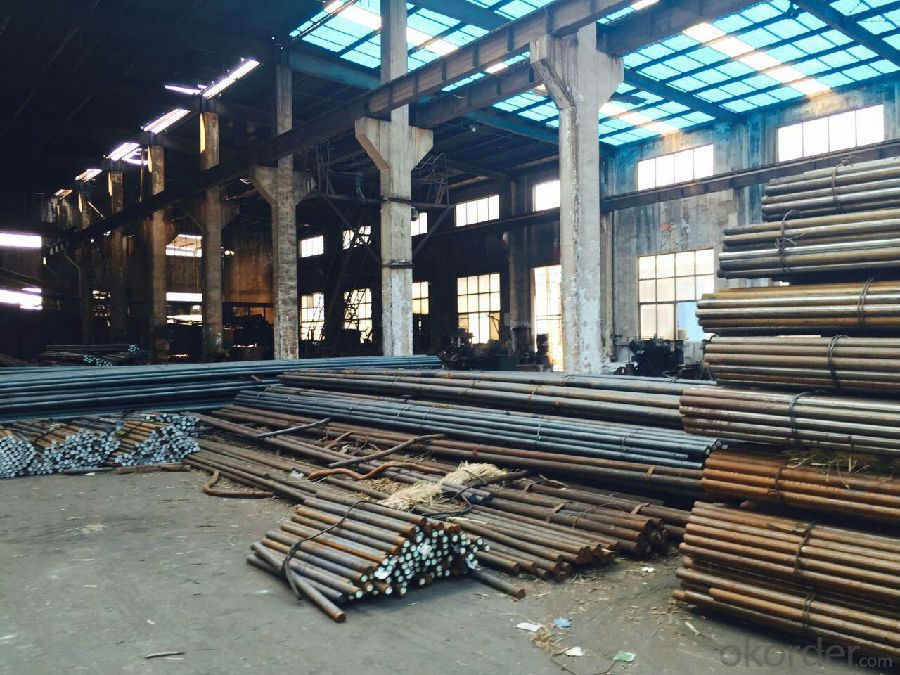
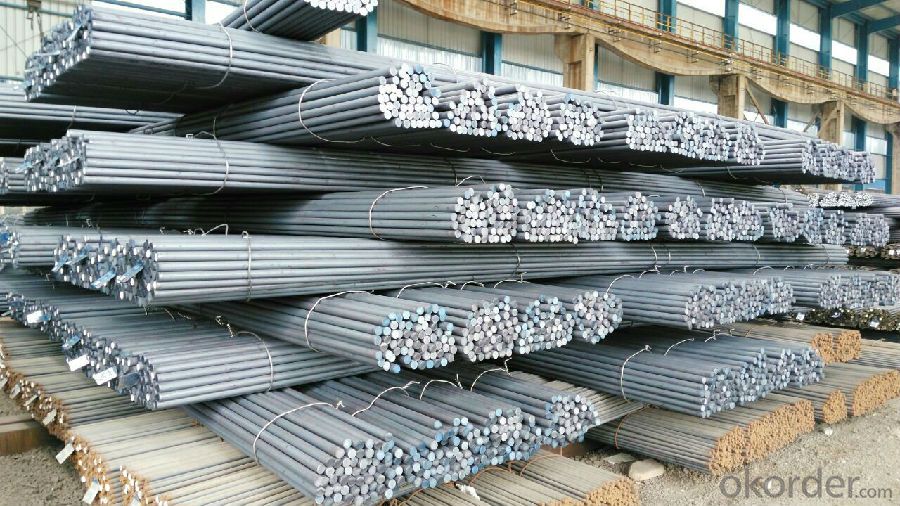
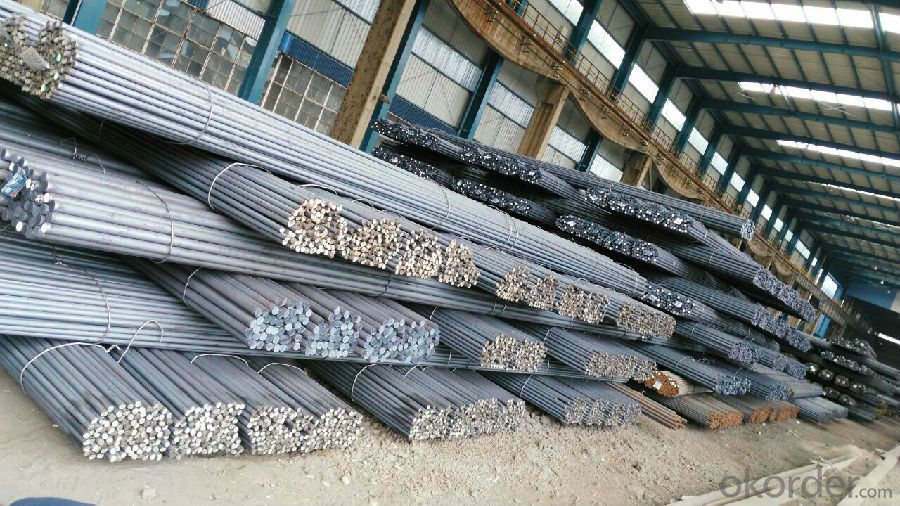
- Q: Can special steel be used in the appliance manufacturing industry?
- Yes, special steel can be used in the appliance manufacturing industry. Special steels, such as stainless steel or high-strength steel, offer various advantages such as corrosion resistance, durability, and enhanced mechanical properties. These qualities make them suitable for manufacturing appliances that require high performance, such as refrigerators, ovens, or washing machines. Additionally, special steels can be customized to meet specific design requirements and can contribute to the overall aesthetic appeal of the appliances.
- Q: How does special steel contribute to the aerospace landing gear industry?
- Special steel plays a vital role in the aerospace landing gear industry by providing the necessary strength, durability, and resistance to extreme conditions. It enables the landing gear to withstand heavy loads, high temperatures, and corrosive environments, ensuring the safe landing and takeoff of aircraft. Additionally, special steel's lightweight properties help reduce the overall weight of the landing gear, resulting in improved fuel efficiency and increased payload capacity.
- Q: How does special steel enhance the durability of products?
- Special steel enhances the durability of products by providing exceptional strength, resistance to corrosion, and wear and tear. Its unique composition and manufacturing processes result in a material that can withstand high pressures, extreme temperatures, and harsh environments, prolonging the lifespan of various products and reducing the need for frequent repairs or replacements.
- Q: What are the main corrosion resistance properties of special steel?
- The main corrosion resistance properties of special steel include high resistance to rust, oxidation, and corrosion in various environments, such as acidic, alkaline, and marine conditions. Special steel is often alloyed with elements like chromium, nickel, and molybdenum, which form a protective layer on the surface and enhance its resistance to corrosion. Additionally, special steel may have a low carbon content, reducing the likelihood of corrosion caused by carbide precipitation. These properties make special steel a reliable choice for applications where resistance to corrosion is crucial, such as in the construction, automotive, and aerospace industries.
- Q: Can special steel be used in the medical industry?
- Yes, special steel can be used in the medical industry. Special steel alloys, such as stainless steel, are commonly used in medical devices, surgical instruments, and implants due to their excellent corrosion resistance, biocompatibility, and sterilization capabilities. These qualities make special steel a reliable and safe choice for various medical applications.
- Q: What are the main applications of special steel in the chemical industry?
- Special steel is widely used in the chemical industry for various applications. One of the main applications is in the construction of chemical processing equipment, such as reactors, storage tanks, and pipes, due to its excellent corrosion resistance properties. Additionally, special steel is used for manufacturing valves, fittings, and pumps, where high strength and resistance to chemicals are crucial. It is also utilized in the production of heat exchangers and condensers, which require materials that can withstand extreme temperatures and corrosive environments. Overall, special steel plays a vital role in ensuring the safety and efficiency of chemical processes in the industry.
- Q: How is special steel tested for quality control?
- Special steel is tested for quality control through a series of rigorous inspections and tests. These can include chemical composition analysis, mechanical property testing, non-destructive testing, and dimensional inspections. Additionally, special steel may undergo heat treatment testing, surface quality evaluations, and microstructure examinations to ensure it meets the required standards and specifications.
- Q: How does the microstructure of special steel affect its performance?
- The microstructure of special steel plays a significant role in determining its performance. Special steels are alloyed with specific elements to enhance their properties and meet specific application requirements. The microstructure refers to the arrangement of the steel's crystalline grains and the presence of any phase transformations within the material. One critical aspect of the microstructure is the grain size. Fine-grained structures, achieved through controlled cooling or alloying additions, offer improved strength, hardness, and toughness. Smaller grain sizes hinder the movement of dislocations within the material, resulting in increased strength and hardness. This is particularly crucial in applications that require high strength-to-weight ratios, such as aerospace or automotive components. Another crucial factor is the presence of various phases in the microstructure. The addition of specific alloying elements can promote the formation of different phases, such as martensite, bainite, or ferrite. These phases have different mechanical properties, such as hardness, toughness, and corrosion resistance. By carefully controlling the microstructure, it is possible to tailor the steel's performance to specific applications. For example, martensitic structures offer high hardness and wear resistance, ideal for cutting tools, while bainitic structures provide a good balance of strength and toughness, suitable for structural components. Furthermore, the microstructure also governs the steel's response to heat treatment processes, such as quenching and tempering. Heat treatments can modify the microstructure to achieve desired mechanical properties, such as increasing hardness or improving resistance to fatigue. The microstructure's ability to transform during heat treatment allows for precise control over the steel's performance characteristics. In summary, the microstructure of special steel significantly affects its performance. Grain size, phase distribution, and response to heat treatment are all key factors that determine the steel's mechanical properties and suitability for specific applications. By understanding and manipulating the microstructure, engineers can design special steels with enhanced performance, meeting the stringent demands of various industries.
- Q: What are the different methods for tempering special steel?
- There are several methods for tempering special steel, each with its own advantages and considerations. Some of the common methods used for tempering special steel include: 1. Air Tempering: This method involves heating the steel to a specific temperature and then allowing it to cool in still air. Air tempering is often used for low alloy steels and results in a uniform hardness throughout the steel. 2. Oil Tempering: In this method, the steel is heated to a specific temperature and then quenched in oil to cool it rapidly. Oil tempering is commonly used for tool steels as it provides a good balance between hardness and toughness. 3. Water Tempering: Similar to oil tempering, water tempering involves quenching the steel in water after heating it to a specific temperature. This method provides a higher rate of cooling and results in a harder steel, but it may also lead to increased brittleness. 4. Salt Bath Tempering: In this method, the steel is immersed in a molten salt bath at a specific temperature. The salt bath provides a more controlled and uniform heat transfer, resulting in a consistent hardness throughout the steel. 5. Cryogenic Tempering: Cryogenic tempering involves cooling the steel to extremely low temperatures, often below -100°C (-148°F), using liquid nitrogen or helium. This method helps to further reduce residual stresses and increase the wear resistance of the steel. It is important to note that the specific method chosen for tempering special steel depends on various factors, including the type of steel, desired hardness, intended application, and the desired balance between hardness and toughness. It is crucial to follow proper heat treatment guidelines and consult with experts to ensure the best results for a specific steel alloy.
- Q: What industries commonly use special steel?
- Special steel, known as alloy steel as well, finds extensive use in diverse industries owing to its exceptional properties and performance characteristics. Several industries frequently employ special steel, including: 1. Automotive Industry: Special steel is extensively utilized in manufacturing automobile components such as crankshafts, camshafts, gears, and axles. Its exceptional strength, durability, and excellent heat resistance make it suitable for enduring the demanding conditions of the automotive sector. 2. Aerospace Industry: The aerospace industry relies on special steel to manufacture critical components like turbine blades, landing gear, and structural parts. Its ability to withstand high temperatures and maintain structural integrity under extreme conditions is vital for aerospace applications. 3. Oil and Gas Industry: In the oil and gas sector, special steel is crucial for applications like drill bits, valves, pipelines, and offshore platform components. Its corrosion resistance, high strength, and ability to withstand extreme temperatures and pressures make it suitable for these challenging environments. 4. Construction Industry: Special steel serves the construction industry in fabricating structural components, reinforcement bars, and high-rise building frameworks. Its high tensile strength, toughness, and resistance to wear and tear ensure the safety and stability of the structures. 5. Tool and Die Industry: The tool and die sector widely employs special steel in manufacturing cutting tools, molds, dies, and various machine components. Its capability to retain sharpness, resist deformation, and withstand high pressures and temperatures make it indispensable for these applications. 6. Energy Industry: Power generation plants, including nuclear, thermal, and renewable energy facilities, extensively utilize special steel. It is employed in manufacturing turbines, boilers, heat exchangers, and other critical components, thanks to its high temperature and corrosion resistance properties. 7. Medical Industry: In the medical field, special steel plays a crucial role, particularly in surgical instruments and implants. Its biocompatibility, strength, and corrosion resistance make it suitable for applications like joint replacements, dental instruments, and surgical cutting tools. 8. Manufacturing Industry: Various manufacturing processes like machining, forging, and casting widely rely on special steel. It is employed in the production of machine tools, industrial equipment, and heavy machinery components due to its high strength, toughness, and versatility. These examples represent just a fraction of the industries that commonly employ special steel. Its unique properties make it an indispensable material for a wide range of applications where strength, durability, heat resistance, and corrosion resistance are critical factors.
Send your message to us
Round Bar C60 Carbon Steel 16-300mm
- Loading Port:
- Tianjin
- Payment Terms:
- TT OR LC
- Min Order Qty:
- 25 m.t.
- Supply Capability:
- 50000 m.t./month
OKorder Service Pledge
OKorder Financial Service
Similar products
Hot products
Hot Searches
Related keywords
